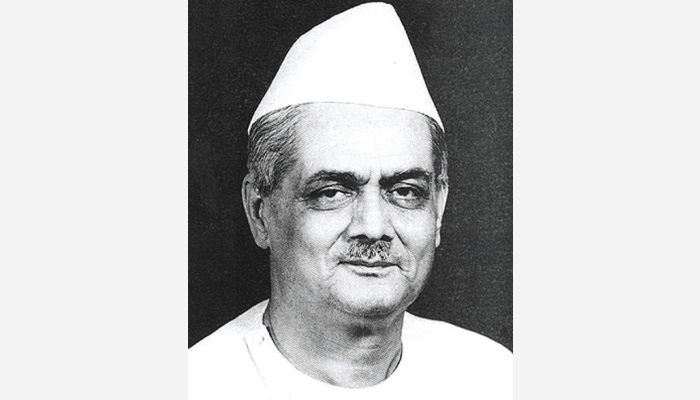
or

Ganesh Vasudev Mavalankar (27 November 1888 – 27 February 1956) popularly known as Dadasaheb was an independence activist, the President (from 1946 to 1947) of the Central Legislative Assembly, then Speaker of the Constituent Assembly of India, and later the first Speaker of the Lok Sabha, the lower house of the Parliament of India. His son Purushottam Mavalankar was later elected to the Lok Sabha twice from Gujarat.
Mavalankar hailed from a Marathi family but lived and worked in Ahmedabad, former capital of Gujarat. His family originally belonged to Mavalange in Ratnagiri district of Bombay Presidency in British India. After his early education in Rajapur and other places in Bombay Presidency, Mavalankar moved to Ahmedabad in 1902 for higher studies. He obtained his B.A. Degree in Sciencefrom the Gujarat College, Ahmedabad, in 1908. He was a Dakshina Fellow of the College for one year in 1909 before beginning his law studies in Government Law School, Bombay. He passed his Law examination in First Class in 1912 and entered the legal profession in 1913. Soon he came into contact with eminent leaders like Sardar Vallabhbhai Patel and Mahatma Gandhi. He became the honorary secretary of the Gujarat Education Society in 1913 and the secretary of the Gujarat Sabha in 1916. Mavalankar was elected to the Ahmedabad Municipality for the first time in 1919. He was a member of the Ahmedabad Municipality during 1919–22, 1925–28, 1930–33 and 1934–37.
Mavalankar joined the Indian Independence Movement with the Non- Cooperation Movement. He was appointed secretary of the Gujarat Provincial Congress Committee during 1921–22. Although he temporarily joined the Swaraj Party in the 1920s, he returned to Mahatma Gandhi and the Salt Satyagraha in 1930. After the Congress abandoned its boycott of elections to the preindependence legislative councils in 1934, Mavlankar was elected to the Bombay Province Legislative Assembly and became its Speaker in 1937. Mavalankar remained Speaker of the Bombay Legislative Assembly from 1937 to 1946. In 1946, he was elected also to the Central Legislative Assembly. Mavalankar remained the President of the Central Legislative Assembly till the midnight of 14–15 August 1947 when, under the Indian Independence Act 1947, the Central Legislative Assembly and the Council of States ceased to exist and the Constituent Assembly of India assumed full powers for the governance of India. Just after independence, Mavalankar headed a committee constituted on 20 August 1947 to study and report on the need to separate the Constitution-making role of the Constituent Assembly from its legislative role. Later, on the basis of this Committee’s recommendation, the legislative and Constitution-making roles of the Assembly were separated and it was decided to have a Speaker to preside over the Assembly when during its functioning as the legislative body. Mavalankar was elected to the office of speaker of the Constituent Assembly (Legislative) on 17 November 1947. With the adoption of the Constitution of India on 26 November 1949, the nomenclature of the Constituent Assembly (Legislative) was changed to the Provisional Parliament. Mavalankar became the Speaker of the Provisional Parliament on 26 November 1949 and continued to occupy the office till the 1st Lok Sabha was constituted in 1952.
On 15 May 1952, after the first general elections in independent India, Mavalankar, who was representing Ahmedabad, was elected the Speaker of the 1st Lok Sabha. The House carried the proposal with 394 votes, against the opponent’s 55. In January 1956, Mavalankar suffered a heart attack, and resigned his office. He died on 27 February 1956 in Ahmedabad after a cardiac arrest, aged 67.
He was one of the guiding force with Sardar Patel in education front of Gujarat and was co-founder of Ahmadabad Education Society along with Kasturbhai Lalbhai and Amritlal Hargovindas. Further, he along with Mahatma Gandhi, Sardar Patel and others was also one of the proposers of an institution like Gujarat University as early as the 1920s, which later came to be founded in 1949
The LW Bureau is a seasoned mix of legal correspondents, authors and analysts who bring together a very well researched set of articles for your mighty readership. These articles are not necessarily the views of the Bureau itself but prove to be thought provoking and lead to discussions amongst all of us. Have an interesting read through.

Lex Witness Bureau

Lex Witness Bureau

For over 10 years, since its inception in 2009 as a monthly, Lex Witness has become India’s most credible platform for the legal luminaries to opine, comment and share their views. more...
Connect Us:


The Grand Masters - A Corporate Counsel Legal Best Practices Summit Series
www.grandmasters.in | 8 Years & Counting
The Real Estate & Construction Legal Summit
www.rcls.in | 8 Years & Counting
The Information Technology Legal Summit
www.itlegalsummit.com | 8 Years & Counting
The Banking & Finance Legal Summit
www.bfls.in | 8 Years & Counting
The Media, Advertising and Entertainment Legal Summit
www.maels.in | 8 Years & Counting
The Pharma Legal & Compliance Summit
www.plcs.co.in | 8 Years & Counting
We at Lex Witness strategically assist firms in reaching out to the relevant audience sets through various knowledge sharing initiatives. Here are some more info decks for you to know us better.
Copyright © 2020 Lex Witness - India's 1st Magazine on Legal & Corporate Affairs Rights of Admission Reserved